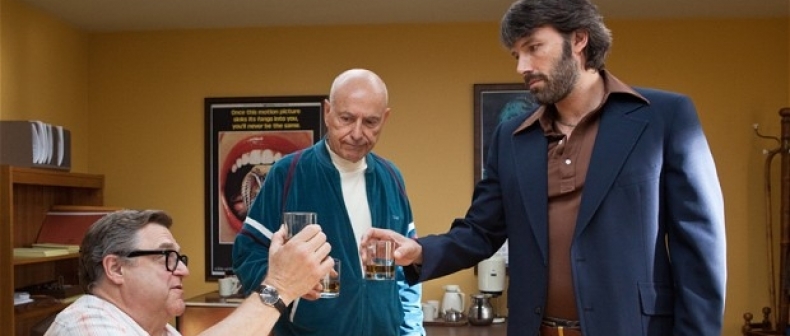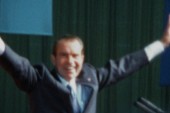
“Argo”
I was as primed to enjoy the new Argo as anybody, but I came away feeling both underwhelmed and vaguely duped. Director Ben Affleck and screenwriter Chris Terrio spend the whole first half of the movie, about the 1980 rescue of six American diplomats in Tehran, showing how the operation came together Stateside, but when we finally see the operation carried out in Iran it’s nowhere near as complex or elaborate as we’d been led to expect. Essentially, it’s a short, uneventful trip to the airport, and much of the planning that went into it is revealed to have been superfluous. This won’t do, of course, so Affleck and Terrio provide plenty of fake, whipped-up suspense: a housekeeper who threatens to betray the mission, then doesn’t; plane tickets briefly waylaid, then found; an all-important phone call almost missed; a ludicrous last-minute chase; etc. There’s nothing wrong with embellishment, but what’s the point of making a “true story” if you have to embellish everything?
To be clear, I wasn’t looking for a documentary. I mean, I was more or less fine with the film drastically downplaying the role of the Canadian ambassador to Iran, who assumed pretty much all the risk by hiding the six American diplomats in his home for three months. I was even fine with it downplaying the role of Canadian intelligence operatives, who were actually in charge of the mission, not the CIA. (The CIA was the junior partner, and spent exactly two days in Tehran.) This is a movie made for Americans, after all, and Americans have a deep, almost pathological need to cheer their own greatness, so why deny them the pleasure? No, my problem with Argo is that it doesn’t do the work of finding drama in what actually happened, preferring instead to take one exceedingly minor element of the operation–a fake science-fiction film invented by the CIA for cover–and blow it way out of proportion.
To get the diplomats out of Iran, the CIA had to supply them with fake identities, so it was decided they should be Canadian filmmakers on a location scouting trip. The plan was hatched by CIA agent Tony Mendez (Affleck), a specialist in subterfuge, and to back it up he reached out to his friend John Chambers (John Goodman), a Hollywood special effects man. According to the Wired Magazine article on which the film is based, all they did was buy a crappy sci-fi script titled Argo; set up an empty production office; print a few business cards; and take out full-page ads in Variety and The Hollywood Reporter to announce the beginning of filming. But Affleck and Terrio turn the fake film into a big dog-and-pony show–cocktail receptions, staged readings, costumes, the works–and make it seem as if the entire operation hinged on it.
For awhile, it’s an amusing conceit, and it gives Alan Arkin a chance to do his funny-crotchety thing as a fictitious movie producer. But it sets up false expectations. It’s clear from what follows that the diplomats could’ve been labelled anything–ornithologists, dairy maids–because the cover story was just that: cover. But Affleck and Terrio won’t let the Hollywood angle go. Even when the action moves exclusively to Iran, they repeatedly cut back to Hollywood, where Goodman and Arkin wait by the phone to continue playing their parts, even though their parts are clearly over. And in Iran, Affleck’s character keeps drilling the diplomats on their fake movie biz roles, leading us to expect they’ll be put to the test eventually. They aren’t. Speaking to the Toronto Star recently, Ken Taylor, the Canadian ambassador to Iran at the time, said that none of the Canadians thought the Hollywood angle necessary. “We didn’t think we really needed something that intricate,” he explained. By trying so desperately to prove otherwise, the movie inadvertently shows just how right Taylor probably was.
If Argo had been a bit more hip, it could’ve been a comedy about American foreign policy, depicting Mendez and his team as a bunch of macho-types eager to play make-believe. In the early Stateside scenes, Affleck’s character could’ve got amusingly carried away with all the Hollywood glitz, and in the later Tehran scenes he could’ve got bummed out that the escape proves so straightforward. That’d be taking artistic license, too, but it would’ve at least been witty and unexpected. As it is, Argo is squaresville–another earnest, Oscar-baiting ode to American heroism and ingenuity.
Many of the movie’s defenders–and there are plenty of them–say the same thing: that they don’t care how many liberties a movie takes if it entertains them. But Argo just barely passes muster as entertainment. The many CIA characters (played by an array of familiar faces, including Bryan Cranston, Kyle Chandler, Titus Welliver, Chris Messina, Philip Baker Hall, and Bob Gunton) are functionaries who do nothing but advance the plot, and Affleck’s character is a personality void. You could defend the performance as “modest,” but only if by modest you mean “dull as fuck.” His handful of “character-building” scenes–domestic moments with his wife and kid–are so blandly soft-focus and inert they’re almost eerie. I kept hoping they’d turn out to be dream sequences and that he’d actually murdered them.
As for Arkin and Goodman’s characters, they’re more lively, but the lines they’ve been given are the usual crusty jabs at Hollywood. Sample gut-buster: “So you wanna come to Hollywood and act like a big-shot without actually doing anything? You’ll fit right in.” Plus, where’s the self-awareness? Though the movie scores numerous laffs pointing out the slickness and fakery of Hollywood, it never once acknowledges it’s own slickness and fakery. The last 30 minutes or so of Argo aren’t that far off from the film-within-the-film parody at the end of Robert Altman’s movie-biz satire The Player. But satire, as George S. Kaufman said, is what closes Saturday night. High-minded phoniness, meanwhile, is what gets you an Oscar.
____
Scott MacDonald writes about cinema for Toronto Standard. You can follow him on Twitter at @scottpmac. He just started tweeting, so be gentle with him.
For more, follow us on Twitter @TorontoStandard and subscribe to our newsletter.














